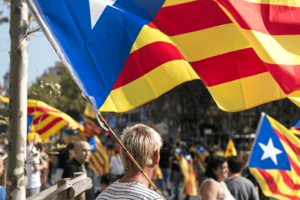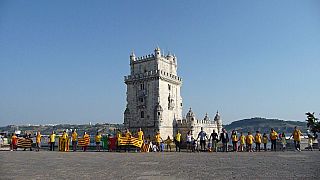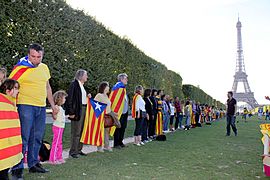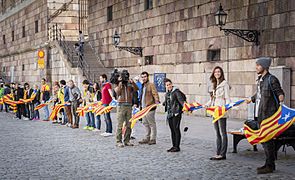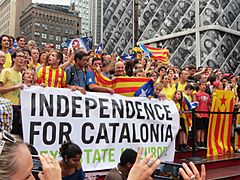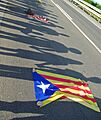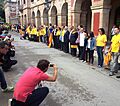Catalan Way facts for kids
Quick facts for kids Catalan Way |
|
|---|---|
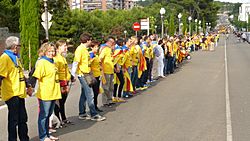
Catalan Way (section 235) in Via Augusta street, Tarragona
|
|
| Date | 11 September 2013 |
| Location |
Catalonia
|
| Goals | Independence of Catalonia |
| Methods | Protest march, street protest |
The Catalan Way (Catalan: Via Catalana) was a very long human chain. It stretched for about 400 kilometers (250 miles). People formed the chain to show their support for Catalan independence from Spain.
The event was organized by the Assemblea Nacional Catalana (ANC). Many other groups also helped. It happened in Catalonia on 11 September 2013. This date is the National Day of Catalonia, called Diada. About 1.6 million people joined the chain. It followed an old Roman road called the Via Augusta. The chain went from Le Perthus near France to Alcanar in Spain. The organizers said it was a symbol of unity for the Catalan people. They wanted to achieve their own country.
Plans for the Catalan Way were first shared in June 2013. The idea came from the 1989 Baltic Way. That was a similar human chain in the Baltic states. Many people signed up to join the Catalan Way. Organizers used about 1,500 buses. They also had 30,000 volunteers to help.
Another similar event, the Catalan Way 2014, happened the next year.
Contents
What inspired the Catalan Way?
The Catalan Way was inspired by the Baltic Way of 1989. In that event, people in Estonia, Latvia, and Lithuania formed a human chain. They wanted their countries to be independent from the Soviet Union. All three countries became independent soon after. The Baltic Way showed that people could peacefully ask for self-determination.
Catalonia had other large protests before the Catalan Way.
- In 2010, a big protest happened in Barcelona. People were unhappy about limits on Catalonia's self-rule within Spain. Over a million people joined this protest.
- Between 2009 and 2011, many towns in Catalonia held local votes on independence. Most people voted "yes."
- In 2012, another huge protest took place. It was organized by the Catalan National Assembly. People wanted Catalonia to become a new country in Europe. About 1.5 million people took part.
Getting ready for the Catalan Way
How people signed up
The Catalan Way was announced in June 2013. Two people who helped organize the Baltic Way were there.
The National Catalan Assembly (ANC) started online sign-ups in July. Over 22,000 people registered in the first day. In the first week, more than 78,000 people signed up. Three weeks before the event, over 350,000 people had registered. Even less populated areas filled up with participants.
During the summer, some cities held practice runs. This helped people understand how the chain would work.
Where did the chain go?
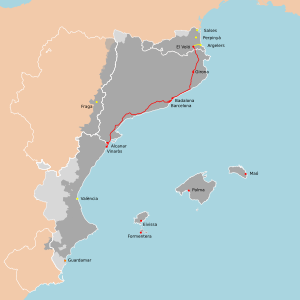
In Catalonia
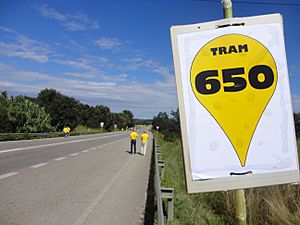
The human chain followed the old Via Augusta road. It went through many towns and cities. Some of the main places included Figueres, Girona, Mataró, Barcelona, Tarragona, and Reus. In Barcelona, the chain went along important streets like Avinguda Diagonal.
Beyond Catalonia
The Catalan Way also had extensions. One went north into France, to Le Boulou. Another went south into the Valencian Community, to Vinaròs. These extensions allowed more people to join.
Around the world
Catalans living abroad also organized their own "Catalan Ways." These events happened in over 116 cities worldwide. They took place between August and September 2013. More than 8,000 Catalans and supporters joined these events. They wanted to show support for Catalonia's independence.
These international events happened in many places, including:
- Americas: Cities like New York City, Mexico City, Buenos Aires, and Santiago.
- Europe: Cities like London, Paris, Berlin, and Rome.
- Africa: Cities like Johannesburg.
- Asia: Cities like Hong Kong and Tokyo.
- Oceania: Cities like Sydney and Auckland.
-
A practice Catalan Way in Lisbon, on 30 August
-
A practice Catalan Way in Stockholm, on 31 August
-
A protest for independence in Times Square, New York City, on 31 August
What happened after the Catalan Way?
Reactions against the chain
Some groups did not support the Catalan Way. They wanted to show support for Spain's unity. One group planned a protest in Barcelona. However, the government said it could not happen at the same time and place as the human chain.
On the day of the Catalan Way, some people attacked an official ceremony in Madrid. They were carrying flags that supported Spain's unity. They caused damage and hurt some people.
Political discussions
After the Catalan Way, the organizers said the Catalan government should set a date for a vote on independence. They wanted a "yes" or "no" question. A Catalan government spokesperson said a date and question should be decided before the end of the year.
The Deputy Prime Minister of Spain said the government needed to listen to all Spaniards. This included those who protested and those who stayed home. Spain's Minister of Foreign Affairs admitted the Catalan Way was well-organized. However, he said Spain would never agree to a vote on independence for Catalonia.
International reactions
The European Commission said they respected the Catalan Way. They knew it was important. But they also said they could not get involved in Spain's internal matters.
The Prime Minister of Latvia said his country would recognize Catalonia if it became independent through a fair process. He said countries have the right to self-determination. However, Latvia later clarified that they see it as an internal matter for Spain.
The Prime Minister of Lithuania also said that each country has the right to choose its own path. He was happy that the Baltic Way had inspired Catalonia. Lithuania's Foreign Ministry later said that Spain is a democratic country and a close partner. They said Spain's issues should be solved using its own laws and constitution.
Later events
The Catalan Way led to similar large protests in the following years. These included the Catalan Way 2014, the Free Way to the Catalan Republic (2015), and Go ahead, Catalan Republic (2016).
Images for kids
-
Catalan Way in Sant Carles de la Ràpita
-
Catalan Way in Amposta
-
Catalan Way in Tarragona
-
Catalan Way at the Camp Nou stadium
-
Catalan Way at the Parliament of Catalonia
-
Catalan Way in Badalona
-
Catalan Way in Palafolls
-
Catalan Way in Pontós
-
Catalan Way in Pont de Molins
-
Catalan Way in Figueres
See also
 In Spanish: Vía Catalana hacia la Independencia para niños
In Spanish: Vía Catalana hacia la Independencia para niños
- Baltic Way
- Human Chain for Basque Self-determination, 2014
- Human Chain for Basque Self-determination, 2018
- Hong Kong Way
- Human chain (politics)
 | Dorothy Vaughan |
 | Charles Henry Turner |
 | Hildrus Poindexter |
 | Henry Cecil McBay |


